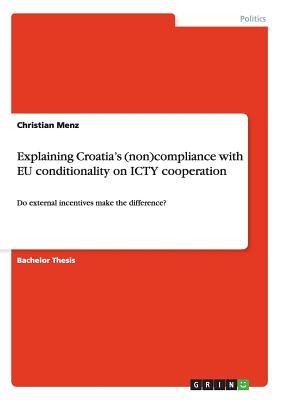
- We will send in 10–14 business days.
- Author: Christian Menz
- Publisher: GRIN Verlag
- ISBN-10: 3656480117
- ISBN-13: 9783656480112
- Format: 14.8 x 21 x 0.4 cm, softcover
- Language: English
- SAVE -10% with code: EXTRA
Explaining Croatia's (non)compliance with EU conditionality on ICTY cooperation (e-book) (used book) | bookbook.eu
Reviews
Description
Bachelor Thesis from the year 2010 in the subject Politics - International Politics - Topic: European Union, grade: 2,3, University of Passau, language: English, abstract: Due to the positive experience with tying progress in negotiations with progress in reform in Central and Eastern Europe (CEE) the European Union (EU) made its membership offer to the Western Balkans (WB) countries conditional on specific democratic principles, most notably (full) cooperation with the International Criminal Tribunal for the former Yugoslavia (ICTY) and respect for the Dayton Peace Accord. Yet although EU membership is regarded as highly attractive both for political elites and the general public in the region, the erratic record of compliance with ICTY-related EU conditionality raises questions about the EU's ability to provide for 'rule transfer' and 'norm diffusion' in the current enlargement round and poses a puzzle to scholars of international relations and EU enlargement alike. As I will demonstrate for the case of Croatia, both the Račan (2000-2003) and Sanader governments (since 2003) have seen many ups and downs of ICTY cooperation. The core question this study addresses is: What factors explain variation in Croatia's compliance with ICTY-related EU conditionality? The investigation period sets in with the democratic turn in 2000 and ends in December 2005, when the last remaining indictee left for The Hague.
EXTRA 10 % discount with code: EXTRA
The promotion ends in 18d.21:51:42
The discount code is valid when purchasing from 10 €. Discounts do not stack.
- Author: Christian Menz
- Publisher: GRIN Verlag
- ISBN-10: 3656480117
- ISBN-13: 9783656480112
- Format: 14.8 x 21 x 0.4 cm, softcover
- Language: English English
Bachelor Thesis from the year 2010 in the subject Politics - International Politics - Topic: European Union, grade: 2,3, University of Passau, language: English, abstract: Due to the positive experience with tying progress in negotiations with progress in reform in Central and Eastern Europe (CEE) the European Union (EU) made its membership offer to the Western Balkans (WB) countries conditional on specific democratic principles, most notably (full) cooperation with the International Criminal Tribunal for the former Yugoslavia (ICTY) and respect for the Dayton Peace Accord. Yet although EU membership is regarded as highly attractive both for political elites and the general public in the region, the erratic record of compliance with ICTY-related EU conditionality raises questions about the EU's ability to provide for 'rule transfer' and 'norm diffusion' in the current enlargement round and poses a puzzle to scholars of international relations and EU enlargement alike. As I will demonstrate for the case of Croatia, both the Račan (2000-2003) and Sanader governments (since 2003) have seen many ups and downs of ICTY cooperation. The core question this study addresses is: What factors explain variation in Croatia's compliance with ICTY-related EU conditionality? The investigation period sets in with the democratic turn in 2000 and ends in December 2005, when the last remaining indictee left for The Hague.


Reviews